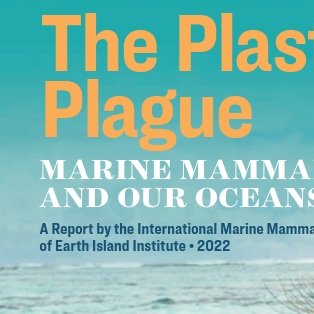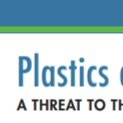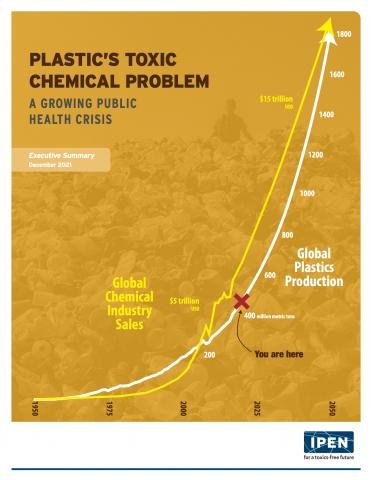
State of the Science On Plastic Chemicals
Although there is a wealth of scientific information on plastic chemicals and polymers to inform policymakers, implementing this evidence is challenging because information is scattered and not easily accessible. The PlastChem report and database address this issue by comprehensively and consistently synthesizing the state of the science on plastic chemicals, including their hazard properties, and their presence in polymers. The state-of-the-science report provides the publicly available evidence to inform policy development that protects public health and the environment.

The Cost of Amazon’s Plastic Denial on the World’s Oceans
For the third year, Oceana analyzed e-commerce packaging data and found that Amazon generated 709 million pounds of plastic packaging waste in 2021. This is a 18% increase of Oceana’s 2020 estimate of 599 million pounds and is enough plastic to circle the Earth more than 800 times in the form of air pillows. Oceana found, based on data from a peer-reviewed study on plastic waste pollution published in Science in 2020, that up to 26 million pounds of this plastic waste will end up in the world’s waterways and seas.

Loopholes, Injustice, & the “Advanced Recycling” Myth
The report exposes misinformation spread by the fossil fuel industry about advanced recycling, chemical recycling, and other toxic and climate-damaging technologies that melt, boil, and burn plastic waste. Just Zero’s report focuses on the American Chemistry Council’s extensive lobbying efforts to create state law loopholes that help these facilities evade public oversight and environmental protections, and provide financial support for advanced recycling.

An Introduction to Plastics and Toxic Chemicals
The health and environmental impacts of plastics are a global crisis. Scientific evidence shows that we have broken through the “planetary boundaries” for chemical and plastics pollution, meaning that production and emissions may be threatening the stability of the entire global ecosystem. To best understand what plastics pollution is, one must understand what plastic is: a material made from carbon (fossil fuels) and chemicals. Plastics do not exist without chemicals, and harmful chemicals are released at every phase of the plastics life cycle – from oil extraction to plastics production, transport, use, and disposal.

Field Measurements Reveal Exposure Risk to Microplastic Ingestion by Filter-Feeding Megafauna
Per day, a krill-obligate blue whale may ingest 10 million pieces of microplastic, while a fish-feeding humpback whale likely ingests 200,000 pieces of microplastic. For species struggling to recover from historical whaling alongside other anthropogenic pressures, our findings suggest that the cumulative impacts of multiple stressors require further attention.

Invisible, Unbreakable, Unnatural: PFAS Contamination of U.S. Surface Waters
While PFAS compounds are believed to be ubiquitous in U.S. waterways, no nationwide surface water quality survey exists. As a result, the levels and effects of PFAS are unknown for many rivers, streams, lakes, and other U.S. surface waters that serve as drinking water sources, recreational waters, and fisheries. To address this troubling lack of information about the presence of, and dangers posed by, PFAS in U.S. surface waters, Waterkeeper Alliance contracted with Cyclopure, Inc., a materials science and environmental engineering firm headquartered in Illinois, to help conduct a monitoring project in which we worked with more than 100 Waterkeeper groups across the United States on an unprecedented initiative to test U.S. surface waters for PFAS contamination.

The Price of Plastic Pollution: Social Costs and Corporate Liabilities
Plastics harm people, the environment, and the economy (“social costs”). Some social costs will inevitably turn into compensation claims against the plastics industry (“corporate liabilities”), which may present these claims to their insurers. In this report, for the first time, we provide quantitative estimates of both the social costs and the corporate liabilities emerging from all forms of plastic-related pollution.

Tracking Trends in Advanced/Chemical “Recycling”
In 2020, GAIA released an alert identifying an alarming trend: legislators were introducing bills to promote the expansion of so-called “chemical recycling” (also known as “advanced recycling”, “waste-to-fuel”, “waste-to-plastic,” “plastic transformation,” and “plastics renewal”), eight of which had been signed into law. This unproven waste management strategy is endorsed by the plastic industry via its lobbying arm, the American Chemistry Council. This alert is an update on that trend, which the petrochemical industry has accelerated.

The Plastics Plague: Marine Mammals and Our Oceans in Peril
A new report, “The Plastics Plague: Marine Mammals and Our Oceans in Peril,” explores the deadly interactions between marine mammals and plastic, from drowning in plastic nets to ingestion and nervous system damage from plastic toxins.

Plastics in Agriculture – An Environmental Challenge
The Foresight Briefs are published by the United Nations Environment Programme to highlight a hotspot of environmental change, feature an emerging science topic, or discuss a contemporary environmental issue. The public is provided with the opportunity to find out what is happening to their changing environment and the consequences of everyday choices, and to think about future directions for policy. The 29th edition of UNEP’s Foresight Brief explores the use of plastic in agriculture and the significant waste problem this entails which impacts on soil health, biodiversity, productivity and food security.

The Big Beverage Playbook For Avoiding Responsibility
Big Beverage companies, including Coca-Cola, PepsiCo, and Nestle, are driving the global plastic pollution crisis. This is due, in large part, to the single-use plastic containers in which they sell their beverages. While all beverage container sales in the United States have skyrocketed in recent years, single-use plastic bottles have become particularly popular among the beverage industry.

Reckoning With the U.S. Role In Global Ocean Plastic
Reckoning with the U.S. Role in Global Ocean Plastic Waste calls for a national strategy by the end of 2022 to reduce the nation's contribution to global ocean plastic waste at every step - from production to its entry into the environment - including by substantially reducing U.S. solid waste generation.

Plastics and Microplastics: A Threat to the Environment and Health
EHHI reviewed nearly 500 scientific studies for this report and found that each of us ingests and inhales millions of microscopic plastic particles each year. Microplastics carry chemical additives and coatings as well as potentially pathogenic microbes. Disturbingly, their impact on human health is not yet known.

Plastic’s Toxic Chemical Problem: A Growing Public Health Crisis
IPEN and IPW studies show that throughout their life cycle, plastics transport and release toxic chemicals globally, posing serious threats to human health and ecosystems.

A Rapid Review and Meta-regression Analyses of the Toxicological Impacts of Microplastic Exposure in Human Cells
The prevalence of microplastics (MPs) is ubiquitous, found in almost every compartment of the environment; in the air (Wright et al., 2020), food (Teng et al., 2019) and drinking water (Zhang et al., 2020). MP contamination will continue to rise as plastic production and use around the world increases (Lebreton and Andrady, 2019). If plastic waste mismanagement continues as it is or increases, it is predicted that within a century, MP ecological risks will be widespread in ecosystems across the world (SAM, 2019; SAPEA, 2019).

The New Coal: Plastics & Climate Change
Beyond Plastics’ new report reveals that the U.S. plastics industry is a major driver of our climate crisis. Using coal-fired power plants as a benchmark, the report examines ten stages in the creation, usage, and disposal of plastics.

